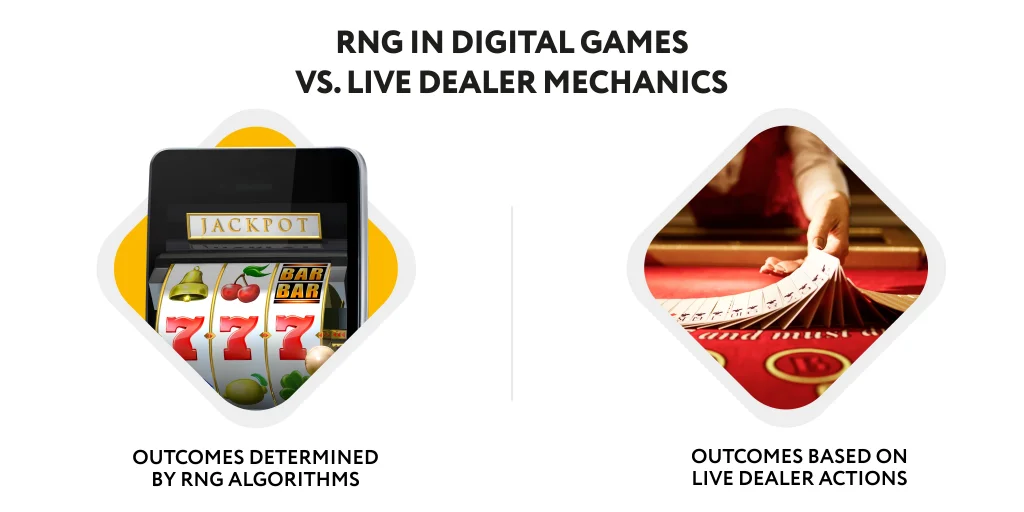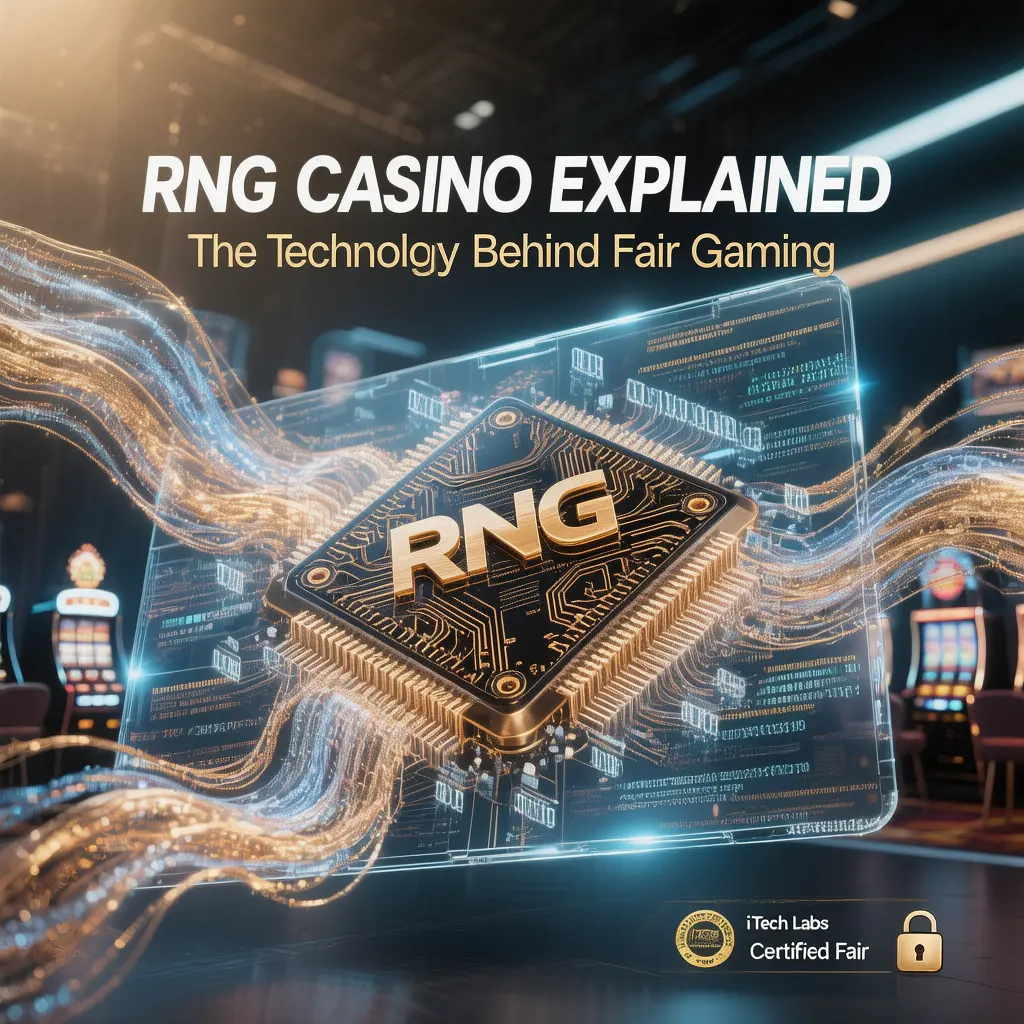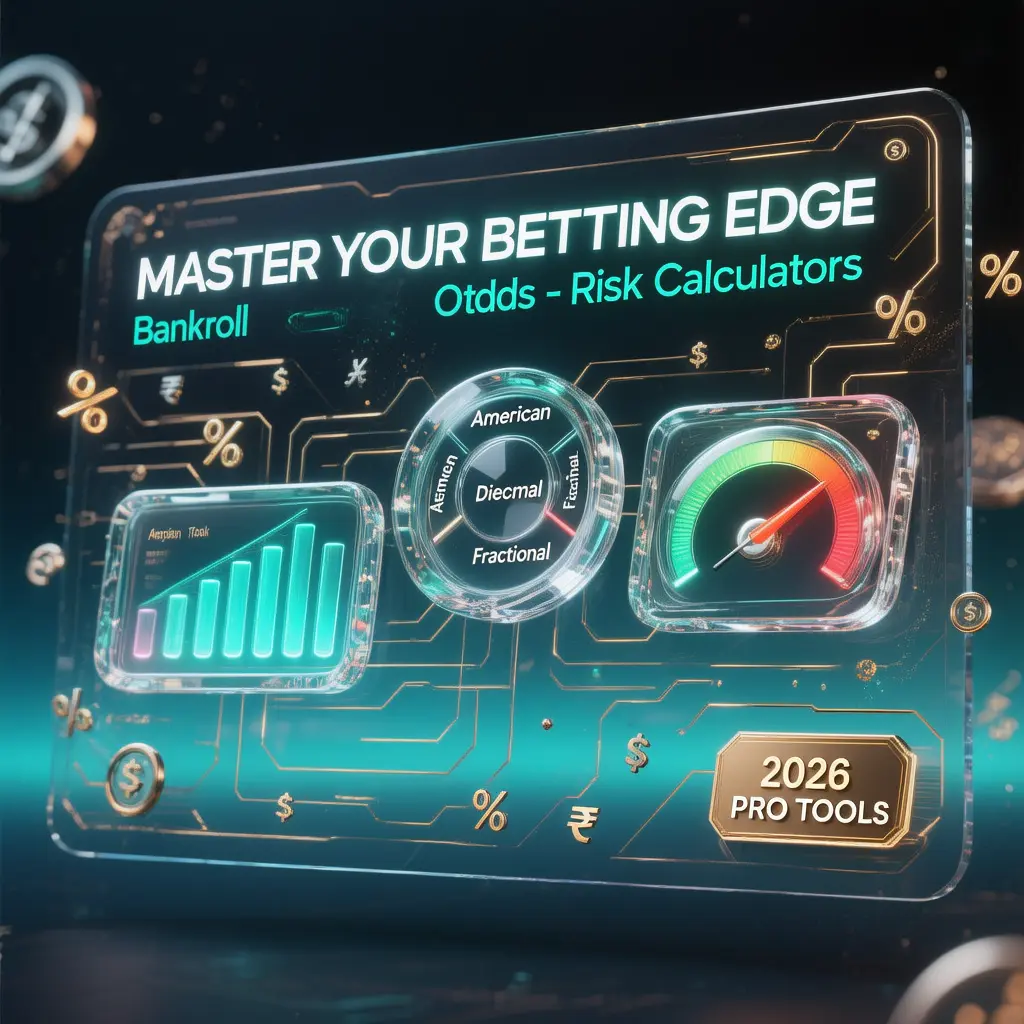What to Cover:
Have you ever wondered if online casino games are truly fair? This comprehensive guide on RNG casino explained will pull back the curtain. We’ll explore the random number generator technology that powers these games, how the casino RNG algorithm works, and why understanding RNG fairness and looking for a certified RNG is crucial for every player. By the end, you’ll know exactly how to trust the games you play.
What is RNG in Online Casinos? (Core Definition)
The Foundation of Digital Gaming Fairness
In the world of online gambling, the term random number generator explained simply means the system that guarantees fair play. An RNG is a complex computer program, or algorithm, that generates sequences of numbers with no predictable pattern. This concept of algorithmic randomness is the heart and soul of any reputable online casino.
Its purpose is simple but vital: to ensure that every spin of a slot reel, every card dealt, and every roll of the dice is completely random and unbiased. This creates outcome unpredictability, meaning neither the player nor the casino can know or influence the result. Without a certified RNG, an online casino cannot legally operate in regulated markets, making it the bedrock of player trust and industry integrity. Unlike a physical casino where you can see the dice roll, online casinos rely on this technology to replicate and even improve upon real-world randomness for fair RNG games.
How Does RNG Work in Online Casinos? (Technical Deep Dive)
While the concept sounds simple, the casino RNG software is a sophisticated piece of technology. It doesn’t just pick a number when you click “spin”—it’s a continuous process that ensures total unpredictability. Here’s a breakdown of how it works.
The Four-Step RNG Process
- Seed Generation: The process starts with a “seed number.” This is an initial value, often generated from unpredictable physical sources (a concept called entropy), that kicks off the algorithm. The security of these RNG seed values is paramount, as they are the starting point for every random sequence.
- Algorithm Execution: The seed number is fed into a complex mathematical formula. The RNG algorithm casinos use is designed to perform millions of calculations on this seed to produce a new, seemingly unrelated number.
- Number Generation: This isn’t a one-time event. The RNG is a powerhouse, generating thousands or even millions of numbers every single second, even when no one is playing the game.
- Game Outcome Mapping: When you hit the spin button, the system instantly grabs the most recent number generated by the RNG. This number is then mapped to a specific game outcome. For example, in a slot game, the number corresponds to a particular alignment of symbols on the reels. This is exactly how does RNG work in online slots and other games.
RNG Speed and Continuous Generation
The sheer speed of the RNG is what makes it impossible to predict. Because the number selection process happens in a millisecond, you could never time your click to get a specific outcome. The number that determines your win or loss was generated in the tiny fraction of a second you decided to act. Furthermore, RNGs have an incredibly long “cycle length,” meaning the sequence of numbers is so vast it won’t repeat for billions of rounds, ensuring the outcome unpredictability of the reel spin mechanics remains intact.
Types of RNG Systems: PRNG vs TRNG
Not all RNGs are created equal. They generally fall into two main categories, with a third, more secure type emerging as the gold standard for iGaming.
Pseudo Random Number Generators (PRNG)
This is the most common type used in online casinos. The “pseudo” in RNG vs pseudo random number generator means it’s not truly random in a physical sense. Instead, this software RNG uses a seed value and a deterministic algorithm to create a sequence of numbers that appears random. While it follows a formula, the complexity of the PRNG algorithm (like the popular Mersenne Twister) and the secrecy of the seed make the outcome practically impossible to predict. It’s the perfect balance of performance and security for most casino games.
True Random Number Generators (TRNG/HRNG)
A True Random Number Generator, also known as a hardware RNG (HRNG), doesn’t rely on a software algorithm. Instead, it uses unpredictable physical phenomena as entropy sources to generate numbers. This can include things like atmospheric noise, thermal fluctuations, or even radioactive decay. While TRNGs offer pure randomness, they are slower and more expensive, making them less common for the high-speed demands of online casino games.
Cryptographic RNG: The Gold Standard
This is where security reaches its peak. A cryptographic RNG combines the speed of a PRNG with principles of cryptographic security. It uses entropy from unpredictable sources to constantly re-seed the algorithm, making it resistant to attacks. This type of RNG is essential for provably fair gaming, as its design ensures that the random sequence is not only unpredictable but also completely tamper-proof. It’s the technology that provides the highest level of assurance against manipulation, making it the ideal choice for cryptographic RNG for online gambling.
RNG Testing and Certification Process
How can you be sure an online casino’s RNG is fair? You don’t have to take their word for it. Every licensed casino must undergo a rigorous RNG testing and certification process conducted by independent, third-party auditors.
Why Independent Testing is Mandatory
Regulatory bodies in all major gambling jurisdictions mandate independent verification to protect players. These third-party audits are non-negotiable for legal compliance. They serve three key purposes:
- Prevent Manipulation: Testing ensures the casino or software provider hasn’t built a backdoor into the system.
- Build Player Trust: A certification seal is a signal to players that the games are fair and trustworthy.
- Ensure Legal Operation: Casinos cannot obtain or maintain a license without proving their RNG integrity.
The Complete Certification Journey
The journey to certification is thorough and multi-faceted. Here’s what the RNG testing and certification process typically involves:
- Source Code Review: Auditors examine the RNG’s source code for vulnerabilities or hidden patterns.
- Algorithm Analysis: They verify the mathematical soundness of the algorithm.
- Statistical Testing: The RNG output is subjected to a battery of intense statistical tests, like the “Diehard tests,” to check for randomness.
- Seed Generation Evaluation: The method for generating and protecting seed values is scrutinized.
- Vulnerability Assessment: Experts try to “break” the RNG to find any potential weaknesses.
- Certificate Issuance: If the RNG passes all tests, a certificate is issued. This process can cost upwards of €3,200 and take 2-8 weeks.
- Continuous Monitoring: Certification isn’t a one-time event. Many jurisdictions require periodic re-certification or even continuous monitoring to ensure ongoing compliance testing and fairness.
Major RNG Testing Laboratories (Comparison)
Several globally recognized labs are trusted to answer the question of who tests RNG software for casinos. These organizations are the gatekeepers of fairness in the iGaming industry.
Industry-Leading Testing Labs
Here are some of the most reputable RNG testing labs whose seals of approval you should look for:
| Testing Lab | Key Focus | Jurisdictions | Notable Standard |
|---|---|---|---|
| iTech Labs | Global compliance, ISO/IEC 17025 accredited | Europe, Asia, Americas | The iTech Labs RNG certification explained process is known for its rigorous, multi-stage testing. |
| eCOGRA | Player protection and European markets | UK, Malta, Spain | eCOGRA RNG testing standards are highly respected for their focus on fair gaming practices. |
| Gaming Laboratories International (GLI) | Worldwide land-based and online gaming | 480+ jurisdictions globally | GLI testing is considered a gold standard, accepted almost everywhere. |
| BMM Testlabs | Oldest private independent gaming lab | Global presence | Known for its two-step verification process and deep industry experience. |
| Technical Systems Testing (TST) | Acquired by GLI, but brand still recognized | North America, Europe | TST certification was a hallmark of quality before its integration with GLI. |
What Each Lab Tests For
These labs use sophisticated methods to ensure mathematical fairness. Key tests include:
- Diehard Tests: A comprehensive suite of 15 different statistical tests that analyze a large sample of numbers for any signs of non-randomness.
- Chi-Square Goodness-of-Fit Test: This checks if the distribution of outcomes is uniform. For example, in a virtual coin flip, it verifies that heads and tails appear roughly 50% of the time over a large sample.
- Cycle Length Verification: Confirms that the sequence of numbers is long enough not to repeat in a practical timeframe.

Reputable testing labs are the guardians of fairness in the online gaming world.
RNG Certification Requirements by Jurisdiction
The rules for RNG testing aren’t the same everywhere. The RNG certification requirements by jurisdiction vary, with some being much stricter than others. This regulatory oversight is crucial for player safety.
United Kingdom (UKGC Standards)
The UK Gambling Commission (UKGC) has some of the most stringent technical standards in the world. Operators must submit a detailed testing strategy and undergo mandatory periodic audits to ensure ongoing compliance.
Malta (MGA Requirements)
The Malta Gaming Authority (MGA) is another top-tier regulator. Its requirements are aligned with EU standards, making an MGA license highly respected across Europe.
Curacao (E-Gaming Licensing)
Curacao offers a more accessible licensing option. While still requiring RNG certification, its process is often seen as a lower-cost alternative, making it popular with many international casinos.
Other Major Jurisdictions
Other key regulators like Gibraltar, Isle of Man, and Kahnawake each have their own specific requirements. A key difference often lies in the frequency of re-certification, with some demanding annual reviews while others are less frequent.
Can Casinos Manipulate RNG Results?
This is the million-dollar question for many players. The short answer is: in a licensed and regulated casino, it is technically and legally impossible. Here’s why.
Technical Impossibility in Licensed Casinos
The question of can casinos manipulate RNG results is answered by several layers of security. The game’s code has a unique digital “fingerprint” (a checksum). If even a single character of the code is changed, the fingerprint no longer matches the one on file with the regulator, and the manipulation would be detected instantly. This manipulation prevention is built into the system. The core RNG algorithm is sealed and hosted by the game provider, not the casino, creating a crucial separation of powers.
Regulatory Safeguards
Regulators enforce strict rules to prevent foul play. Casinos don’t create the games; they license them from software providers like NetEnt, Microgaming, or Playtech. These providers control the RNG, and the casino has no access to modify it. Attempting to do so would result in massive fines and the loss of their license. This system provides a strong fairness guarantee and addresses the concern of “are online casino RNG games rigged?” with a definitive “no” for licensed operators.
Red Flags: How to Spot Suspicious Operations
While licensed casinos are safe, you should be wary of unregulated sites. Here are some warning signs:
- No visible licensing information on the website.
- Games from unknown or unverified software providers.
- Missing RNG certificates or seals from labs like eCOGRA or iTech Labs.
- Unrealistically high bonus offers or RTP claims that seem too good to be true.
Learning to spot these red flags is key to being able to trust casino RNG systems.
How to Verify RNG Fairness as a Player
You don’t need to be a tech expert to do your own due diligence. Here’s a simple guide on how to verify RNG fairness casino style before you play.
Step-by-Step Verification Guide
- Check the Casino License: Scroll to the footer of the casino’s homepage. Look for the logo and license number of a reputable regulator (e.g., UKGC, MGA).
- Identify Software Providers: See which companies provide the games. Reputable casinos proudly display partners like NetEnt, Evolution, and Microgaming.
- Look for Testing Lab Seals: Also in the footer, look for logos from iTech Labs, eCOGRA, or GLI. This is how you check RNG certification at a glance.
- Access Certification Documents: Many casinos have a “Fair Gaming” or “RTP” page where you can view or even download the actual certificates.
- Verify Certificate Validity: Check the dates on the certificate to ensure it’s current.
What Certified RNG Seals Look Like
These seals are more than just images; they are often clickable links that take you to the official certificate on the testing lab’s website. This allows you to verify its authenticity directly. Seeing these logos for certified RNG games is one of the strongest player trust signals.
Blockchain RNG vs Traditional Casino RNG
A new technology is changing the conversation around fairness: blockchain. This brings a new dimension to the blockchain RNG vs traditional casino RNG debate.
The Provably Fair Revolution
Blockchain technology enables what’s known as provably fair gaming. This system uses cryptographic hashing to allow players to independently verify the outcome of every game round. It’s a “verify-don’t-trust” model that offers unprecedented transparency.
Traditional RNG: Trust-Based Model
The traditional model, used by nearly all major regulated casinos, is a “trust-based” system. You trust the regulators and third-party auditors to ensure fairness. While highly reliable, you cannot personally verify the randomness of each outcome.
Blockchain RNG: Verify-Don’t-Trust Model
With a provably fair RNG, the casino provides a hashed version of the game’s outcome before you play. After the game, you receive the key to unlock the hash, proving the result wasn’t altered. This use of cryptographic security puts the power of verification directly in the player’s hands. While promising, this technology is still new and faces challenges in adoption and scalability.
RNG in Different Casino Game Types
The RNG algorithm casinos use is versatile, but its application varies depending on the game you’re playing.
Online Slots and RNG
This is the most direct application. The RNG’s number determines where each reel stops, which symbols appear, and whether bonus features are triggered. The entire outcome of how does RNG work in online slots is decided in the instant you press the spin button.
Table Games (Roulette, Blackjack, Baccarat)
For virtual table games, the RNG replicates real-world actions. In roulette, it selects the winning number. In card games, it uses a card dealing algorithm to create a perfectly shuffled deck for every hand, ensuring a fair shuffle that is more random than any human dealer could achieve.
Live Dealer Games: Where RNG Doesn’t Apply
The main difference between RNG and live dealer games is that live games don’t use an RNG for the primary outcome. Instead, they use real dealers, real cards, and real roulette wheels, streamed to you via video. The randomness is physical, just like in a land-based casino. However, some live games may use an RNG for side bets or bonus rounds.
Common RNG Myths Debunked
Misconceptions about RNGs are common. Let’s clear up a few and reinforce the principles of RNG fairness.
Myth 1: “Casinos can change the RNG after big wins.”
Reality: False. The game software is sealed and monitored. Any change would be immediately flagged by regulators. The concern that are online casino RNG games rigged in this way is unfounded in licensed casinos.
Myth 2: “RNG has patterns you can predict.”
Reality: False. The entire point of statistical testing is to ensure no predictable patterns exist. Each outcome is independent.
Myth 3: “Bet size affects RNG outcomes.”
Reality: False. The RNG is completely separate from the betting system. It generates numbers regardless of how much you wager.
Myth 4: “Hot and cold streaks mean the game is rigged.”
Reality: False. This is due to a statistical concept called variance. In a truly random system, clusters of similar outcomes (streaks) are normal and expected. They don’t indicate a problem with RNG fairness.
How Often is RNG Tested in Online Casinos?
The question of how often is RNG tested in online casinos is crucial for ongoing trust. Testing isn’t a one-and-done deal.
Initial Certification vs Ongoing Testing
Every new game undergoes comprehensive testing before launch. After that, regulators require periodic certification, typically on an annual basis. More advanced systems also use continuous monitoring, where software analyzes game results in real-time to detect any statistical anomalies that could indicate a problem. This ensures ongoing compliance testing.
What Triggers Additional Testing
Beyond scheduled audits, additional testing can be triggered by:
- Major software updates or game patches.
- Spot checks or audits by regulatory bodies.
- A high volume of player complaints about a specific game.
- Requirements for license renewal.
The Future of RNG Technology in iGaming
As technology evolves, so does the quest for perfect randomness and security. If you want to learn RNG technology, keep an eye on these future trends.
Quantum Random Number Generators
The next frontier is Quantum RNG. This technology harnesses the inherent randomness of quantum physics to generate numbers that are truly unpredictable and, in theory, unhackable. While still in its early stages, it represents the ultimate in cryptographic security and game integrity.
AI-Monitored Fair Play Systems
Artificial intelligence and machine learning can be used to monitor game outcomes in real-time, detecting subtle statistical deviations that might be missed by traditional tests. This offers an enhanced layer of player protection.
Increased Transparency Demands
The trend is moving towards greater transparency. We can expect to see more casinos adopting provably fair systems, providing players with real-time dashboards to view RNG performance, and integrating blockchain for ultimate accountability.
Conclusion
As this deep dive into RNG casino explained has shown, the Random Number Generator is the unsung hero of the online gaming world. It’s the complex, heavily audited technology that ensures every game you play is fair, unbiased, and unpredictable. By understanding the importance of a certified RNG, you can confidently choose licensed casinos that offer genuinely fair RNG games.
The power is now in your hands. You know how the system works, who tests it, and how to check for yourself. The next time you play, you can trust casino RNG technology, knowing that your luck is the only thing that determines the outcome. Always remember to verify RNG fairness by checking for licenses and certification seals before you play.
With over 20 years of experience in the iGaming industry, Anilgnews provides expert analysis and in-depth content to help players and operators navigate the complexities of online gambling regulation. Contact Here For Paid Collaborations anilguptadm12@gmail.com.





